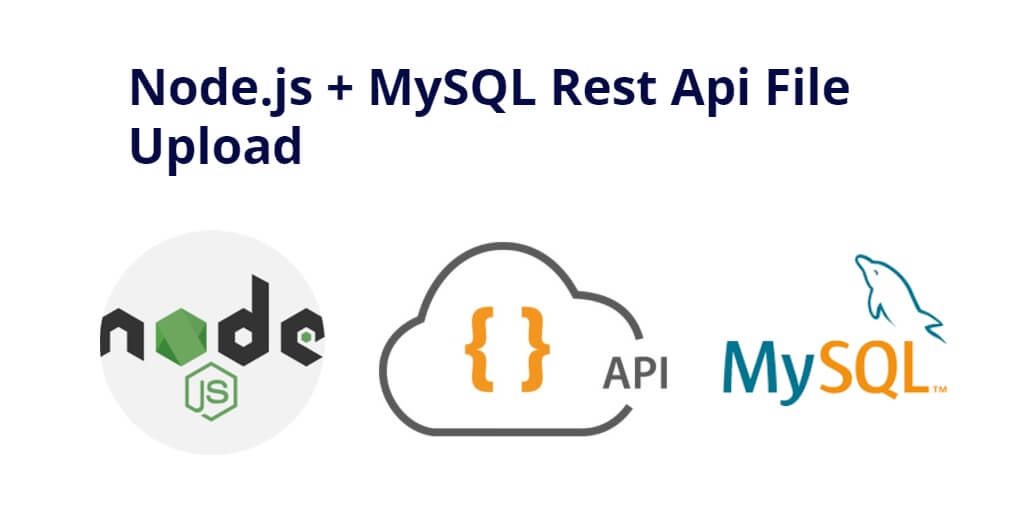Node js MySQL image file upload rest API example; This tutorial will show you how to upload an image file into MySQL database in node js express using rest APIs with multer package.
Throughout this tutorial steps, you will learn how to create file upload REST API using Node js + MySQL + Express js to upload files in MySQL database. And, will also find out how to use multer in Node.js for handling multipart/form-data for uploading files into MySQL database via rest apis.
Node js Rest API File Upload to MySQL Database Example
Let’s follow the following steps to upload image file into MySQL database in node js express using REST API:
- Step 1 – Create Node Express js App
- Step 2 – Install Express + Mysql + Body parser + cors and Multer Library
- Step 3 – Create Database and Connect App to DB
- Step 3 – Create Server.js File
- Step 4 – Start Node Express Js App Server
- Step 5 – Upload File using Rest Api App
Step 1 – Create Node Express js App
Execute the following command on terminal to create node js app:
mkdir my-app cd my-app npm init
Step 2 – Install Express + Mysql + Body parser + cors and Multer Library
Install express, body parser, cors and multer library into your node js express application by executing the following command on command prompt:
npm install express body-parser mysql cors multer --save
- Express — Node.js Express is a minimal and flexible Node.js web application framework that provides a robust set of features for web and mobile applications.
- body-parser — Node.js request body parsing middleware which parses the incoming request body before your handlers, and make it available under req.body property. In other words, it simplifies the incoming request.
- cors — It’s an Express middleware for enabling Cross-Origin Resource Sharing requests. Just because of it, We can access the API in different applications.
- multer — Multer is a node.js middleware for handling multipart/form-data, which is primarily used for uploading files. It is written on top of busboy for maximum efficiency.
- MySQL — MySQL an open-source relational database management system (RDBMS).
Step 3 – Create Database and Connect App to DB
Execute the following sql query to create a database and table:
CREATE DATABASE my-node; CREATE TABLE `files` ( `id` int(11) NOT NULL, `name` varchar(255) NOT NULL, ) ENGINE=InnoDB DEFAULT CHARSET=latin1;
Then Connect app to database; so visit your app root directory and create a new file name database.js. Then add the following code into it to connect your app to database:
var mysql = require('mysql');
var conn = mysql.createConnection({
host: 'localhost', // Replace with your host name
user: 'root', // Replace with your database username
password: '', // Replace with your database password
database: 'my-node' // // Replace with your database Name
});
conn.connect(function(err) {
if (err) throw err;
console.log('Database is connected successfully !');
});
module.exports = conn;
Step 4 – Create Server.js File
Create server.js file and import express, mysql, multer, path dependencies in server.js and create file upload rest api route; as shown below:
var express = require('express');
var path = require('path');
var cors = require('cors');
var bodyParser = require('body-parser');
var multer = require('multer')
var db=require('./database');
var app = express();
var port = process.env.PORT || 3000;
// enable CORS
app.use(cors());
// parse application/json
app.use(bodyParser.json());
// parse application/x-www-form-urlencoded
app.use(bodyParser.urlencoded({extended: true}));
// serving static files
app.use('/uploads', express.static('uploads'));
// request handlers
app.get('/', (req, res) => {
res.send('Node js file upload rest apis');
});
// handle storage using multer
var storage = multer.diskStorage({
destination: function (req, file, cb) {
cb(null, 'uploads');
},
filename: function (req, file, cb) {
cb(null, `${file.fieldname}-${Date.now()}${path.extname(file.originalname)}`);
}
});
var upload = multer({ storage: storage });
// handle single file upload
app.post('/upload-avatar', upload.single('dataFile'), (req, res, next) => {
const file = req.file;
if (!file) {
return res.status(400).send({ message: 'Please upload a file.' });
}
var sql = "INSERT INTO `file`(`name`) VALUES ('" + req.file.filename + "')";
var query = db.query(sql, function(err, result) {
return res.send({ message: 'File is successfully.', file });
});
});
app.listen(port, () => {
console.log('Server started on: ' + port);
});
Step 5 – Start Node Express Js App Server
Execute the following command on terminal to start node express js server:
//run the below command npm start after run this command open your browser and hit http://127.0.0.1:3000/upload-avatar
Step 6 – Upload File using Rest Apis App
To upload files using rest apis; So open postman for sending HTTP multipart/form-data requests: as shown below picture:

Conclusion
Node js express + MySQL rest API file upload example tutorial; you have learned how to build REST API for file uploading in MySQL database using rest API in Node.js, Express.js + Multer.
